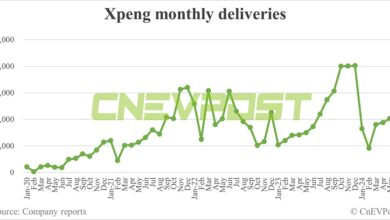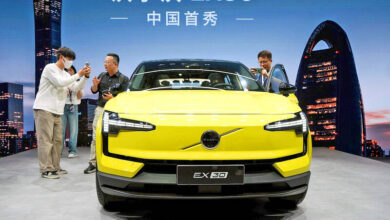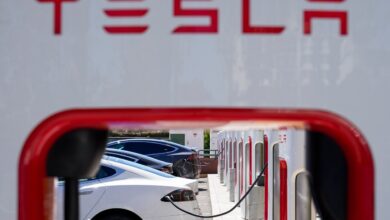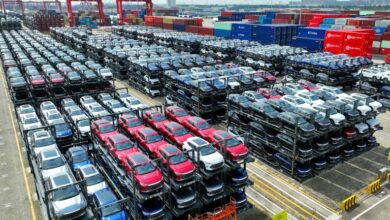Kemp: Georgia’s Electric Vehicle Success Driven by More Than Subsidies
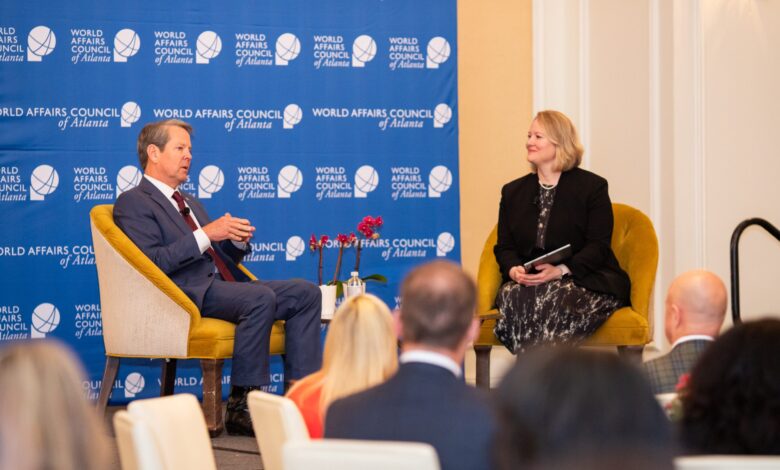
To hear the Biden administration tell it, the Inflation Reduction Act is driving generational investment in clean energy and electric vehicles across the U.S.
Georgia Gov. Brian Kemp, who leads a state where billion-dollar foreign investments in these fields have become routine, is skeptical that $369 billion in subsidies is what’s actually moving the needle.
At a World Affairs Council of Atlanta discussion on the state’s global competitiveness, the governor pointed out that Rivian and Hyundai announced their plants in Georgia before the unveiling of the law’s incentives in August 2022.
“This market was coming here anyway,” Mr. Kemp said in during a conversation with council President Rickey Bevington in which he touted Georgia’s award-winning department of economic development, infrastructure investments and low-tax environment as the key considerations for auto makers, suppliers and clean-energy firms investing in the state.
“When you think about EVs and the mandates that are on EVs, it’s really messed the whole marketplace up,” the Republican governor said in a wide-ranging conversation over lunch at the St. Regis in Buckhead. “I wish the president had never done that. When you try to force people to do something, half of the country is not going to like that. We saw that with the vaccine.”
At the heart of the governor’s comments is a disconnect between Democrats and Republicans — and between congressional leaders and state officials — on whether market forces or industrial policy are (or should be) the primary drivers of such transformational investments.
Companies like Qcells, a Korea-based maker of solar panels with a factory in Dalton and a new one that just began producing panels in Cartersville, have tried to thread this political needle.
The company announced a $2.5 billion expansion with plants in Dalton and Cartersville only after the IRA’s passage, explicitly crediting solar-energy credits in the law written by Democratic U.S. Sen. Jon Ossoff with helping its U.S.-made panels compete with China. In a news release, the company also praised Mr. Kemp and both Georgia
Other investors have found themselves caught in the middle, as when Hyundai and Kia found their EVs originally excluded from the IRA’s clean-energy tax incentives, even as they were building electric-vehicle production lines in Georgia and Alabama.
During the conversation, Mr. Kemp asserted that this oversight smacked of pandering to union-backed plants, prompting him to send a letter to both of Georgia’s Democratic U.S. senators urging a carveout for foreign automakers in the process of investing billions of dollars here.
“They voted for the bill anyway without demanding that we treat everybody fairly: Either give the tax credits to everybody or don’t give it to anybody,” Mr. Kemp said.
That’s emblematic of the way Georgia supports companies that place their bets on the state, he said, touting its decade-long ranking as the No. 1 state for business by Site Selection magazine.
“If you’re here, no matter where you’re headquartered, we’re going to treat you like a Georgia-based company, and we’re going to fight for you, and I think we have a great track record of doing that,” he said.
As an example, he shared another intervention on behalf of a Korean firm, this time with President Biden more than a year before the IRA’s passage. When the International Trade Commission ruled against SK Battery, which had already put a $2.6 billion plant in Georgia, in its trade dispute with LG Chem, Mr. Kemp appealed to the president, who could override the ITC decision.
“I called the president one day and I said, ‘Look, you can make this decision. You ran on on-shoring and bringing jobs back to the United States of America — this was long before IRA. I said, ‘If you don’t support SK in this, these jobs are going to China.”
The companies later reached a deal to avert the closure of the plant in Georgia; Mr. Ossoff claimed to have helped broker it.
China EV, Subsidy, Security Concerns
Asked about the meaning of Mr. Biden’s decision to slap a 100 percent tariff on Chinese electric vehicles this week, Mr. Kemp took a less political tack, except to make one crack at the outset.
“I think it means that Trump will do 150 percent,” he said, to laughter from the audience.
He then laid out how Chinese automakers have leapfrogged other countries in battery and electric vehicle technology using subsidies, a concern the Biden administration has also voiced.
“I’m a free-market person, but it’s also got to be fair for everybody, and I think when you’re dealing with China it’s just not fair,” Mr. Kemp said.
In a trip to China last month, U.S. Treasury Secretary Janet Yellen pushed China to address its industrial “overcapacity,” a longstanding problem that has become a bipartisan rallying cry.
Visiting Georgia the week before her trip, Ms. Yellen stopped at solar-cell manufacturer Suniva to tout how the IRA was helping the long-dormant firm revive its U.S. manufacturing as a counterbalance to China’s dominance of the solar supply chain.
Mr. Kemp seemed open to these arguments, recalling supply-chain vulnerabilities made plain by the pandemic.
“We absolutely have to figure out ways to diversify our supply chain. It’s going to be tough on Americans, and it may cost us more to do that, but I remember during COVID, the only place you could get a mask, a surgical gown or a respirator was from China, and they absolutely took us to the cleaners. We just cannot be in that situation,” Mr. Kemp said.
That said, Mr. Kemp expressed skepticism that tariffs and other interventions would be sufficient, saying that Chinese companies would likely find a workaround by building plants in Mexico.
He instead suggested that companies like Hyundai showed a more sustainable path forward. Amid an EV sales pullback nationally, the auto maker is pivoting to make a hybrid at its Meta Plant near Savannah, which it previously said would be dedicated to battery-electric vehicles. But Mr. Kemp said the company is also accelerating construction to start production early and capture market share from competitors.
“They’re just going to meet the market wherever it is, and they’re not going to back up. Their philosophy is ‘Look, we’ve got to figure out how to compete with China,’ and they feel like with their automation and the logistical gains that they’re going to have by being here, that they can do that. We’ll see how that plays out.”
An Electric Mobility Hub
Prompted by Ms. Bevington, Mr. Kemp laid out the vision behind his Electric Mobility and Innovation Alliance, an initiative to make Georgia the world leader in a sector that he views as going far beyond cars.
He cited Archer Aviation’s plans to create 1,000 jobs building flying taxis known as electric vertical takeoff and landing vehicles (eVTOLs) at a factory in Covington, as well as a small utility vehicle he test-drove at Club Car in Augusta, where that company and rival E-Z-GO make 80 percent of the golf carts sold around the world.
Mr. Kemp said the practicality of electric vehicles and tools should drive their adoption, not mandates that risk alienating users that are otherwise open to them.
“They may have a big diesel truck that they’re pulling the bass boat to the lake on, but they’re using an electric trolling motor. They’re playing golf on the weekend, driving an electric golf cart. I’ve worked the past month … at our house using a small battery-powered chainsaw — it’s awesome. You can see where the uses are going to be there,” he said. “And if you drive one of these electric vehicles — we were at Porsche the other day — it will snap your head back.”
The governor said Georgia’s efforts to woo data centers and advanced manufacturing plants have been aided by the addition of clean nuclear energy capacity at Plant Vogtle, suggesting that the state look now at replicating this despite potential “PTSD” at Georgia Power over the cost overruns and missed deadlines associated with the first reactors built in the U.S. in more than 30 years.
In the discussion, the governor explained his reasoning behind vetos of SB 368, which would have barred foreign nationals from making political contributions, and HB 1192, which would have ended a tax credit for data-center construction.
On the former, he said it would have duplicated a federal law while requiring executives from foreign companies to essentially register as lobbyists, which he called an unintended consequence of the bill’s language.
On the latter, his decision was less about the substance and more about the abrupt July 1 cutoff for the data-center incentive, saying it was unfair to those with projects underway.
He also laid out how the state uses its university system, technical colleges and Quick Start workforce training program to outcompete other states and to fulfill its promise to investors who need thousands of workers — a key priority as the state continues to see record job-creation and capital investment.
He highlighted the state’s Georgia Match program, which enables high school seniors to register transcripts online and get a letter in the mail listing the Georgia colleges and universities where they’ve been automatically admitted.
“Make sure they understand that this is not junk mail,” Mr. Kemp said. “It’s their ticket to economic opportunity in our state.”
He asked World Affairs Council members and backers to continue supporting their economic development department and elected officials, telling the Georgia story around the world as he has done at the World Economic Forum in Davos, Switzerland, the last two years — against the counsel of some in his party.
Mr. Kemp said he “caught hell” from Republicans worried he would be “corrupted by George Soros” or get “brainwashed out there.”
For him, though, the trip was about selling “the Georgia way” globally and meeting with a slew of foreign executives, all in one place, inside and outside the confines of the conclave. GF Castings, a company the governor visited in Switzerland during this year’s trip, just announced a $184 million investment in Augusta.
“It was just very productive,” he said. “The amount of CEOs and companies that we were already doing business with, companies that we’re talking to about doing business, or either just getting on people’s radar, was incredible. It probably saved us, I bet, two or three international trips.”
Ultimately, he said, recruiting more foreign investment is about creating opportunity for Georgians, especially in the rural areas the governor ran on revitalizing. And with the track record the state has built so far, companies around the world don’t have to take his word for it.
“We’ll give them our opinions and our story. But at the end of the day, we can say, go talk to Gulfstream, or you can talk to Coca-Cola or UPS or Delta or Home Depot, and you can ask them what it’s like to have a corporate headquarters in the state or what is it like to manufacture in the state. Our best salespeople are our existing businesses.”
